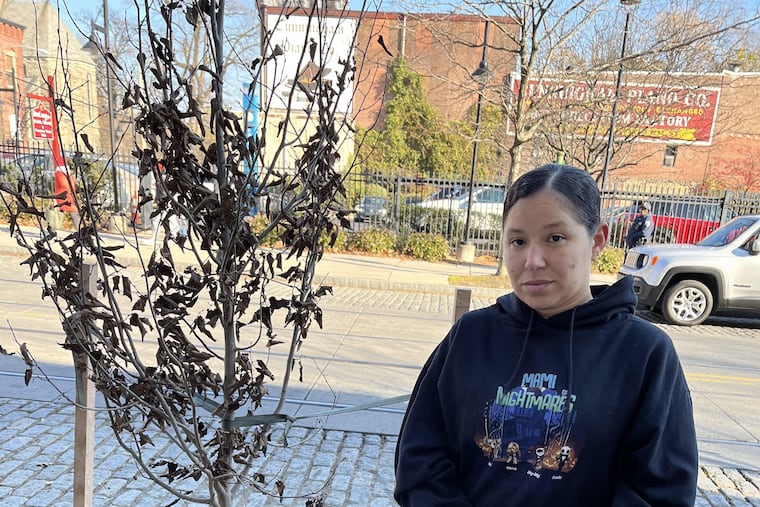Police left Elizabeth Negron in the street. She was killed in a hit-and-run.
After Elizabeth Negron wandered into the street at Germantown Avenue and Coulter Street, vehicles swerved around her, police came by, but she was left lying in the street. Soon after, she was killed.

I was driving in North Philly not all that long ago, and while stopped at an intersection, I spotted a middle-aged woman literally sitting in the street.
When the light turned green, I went to put my foot on the gas but realized I couldn’t leave her there. I pulled over, got out of the car, grabbed her by the armpits, dragged her to her feet, and put her on the sidewalk. Then I barked at her, “Go home!” She tottered off, hopefully in the direction of wherever it was that she lives.
I knew I had taken a chance. Anything could have happened. But I was able to drive off knowing that I hadn’t left a human being sitting in the street, where she could have been run over.
That’s why I can’t understand what happened when Elizabeth Negron wandered into the middle of Germantown Avenue near Coulter Street around midnight on July 3.
According to video provided by a neighborhood business, for a time she blocked the path of a SEPTA bus, and vehicles were going around her in different directions. At one point, a police car pulled up. Officers exited the vehicle and appeared to engage with her briefly before driving off, leaving Negron still in the roadway. At one point, Negron can be seeing seen lying on her back.
The video ends shortly thereafter, leaving viewers to imagine the final horrific moments of her life when a passing car ran her over and fled the scene. She was left in the street and she died.
» READ MORE: Slow down, drivers. People are dying.
A free spirit who made friends easily, the North Philly resident was a mother, a sister, and a friend. Her sister, Jackie Martinez, described Negron as “a little wild girl.” But she was “loving and caring,” Martinez said last week after a tree-planting memorial for her sister. “She was a joy to be around. Funny. She could be serious but her thing was more being fun and loving than anything else.”
But now her daughters — ages 5 and 11 — have to grow up without their mother.
Nobody knows what it was that made her go into the street and lie down the way that she did.
Her family wants to know what happened, as do members of the community, who already were traumatized by what had happened to Dia Lee, a beloved employee of Uncle Bobbie’s Coffee & Books who was killed in a hit-and-run as she was leaving work near that same location just a week before.
“Her family wants to know what happened, as do members of the community.”
As Pennsylvania State Rep. Darisha Parker (D., Phila.) told me last week, “The community is still owed an explanation.”
I tried to help get information about the case by emailing the District Attorney’s Office. “We generally do not comment on or even confirm the existence of criminal investigations until such time as an arrest is made or warrant is issued,” spokesperson Jane Roh said via email. A spokesperson for the Philadelphia Police Department informed me that “the incident is still under internal affairs investigation.”
The community, and Negron’s family, deserve answers. Why did the police leave her in the street, where she was so at risk?
“We need to know if [the police] were called away on an emergency, and if they were called away on an emergency, what happens with what you are handling at that time? What is the protocol?” Sharrieff Ali, a cochair of the newly formed Germantown Traffic Safety Coalition, said. “Is there a backup team that is supposed to assist you? Do you bring people to a station? It doesn’t make sense to me.”
David Fisher, a 29-year veteran of the Philadelphia Police Department and president of the National Black Police Association, told me that there’s only so much cops can do in these situations. “As police officers, there’s no policy saying that the officers were responsible for taking that person off the street, because where do you take them?” he said. “That’s no more different than in Kensington where you’ve got people with needles in their arms leaning on corners.”
If Negron, who had struggled with addiction, had been experiencing a mental health crisis, police are often not the best people to respond. But often, they are the only ones who do show up.
“With the video that I’ve seen, they pretty much just left her there,” Martinez pointed out. “Then they just drove off. She was in the middle of the street ... You could clearly see that there was something wrong with her.”
Philadelphia has pledged to expand the use of mobile health crisis teams for people experiencing mental health emergencies, but still do not have nearly enough of these teams to meet the city’s needs. “This woman needed social services. She didn’t need the services of the police,” Fisher said.
Negron deserved better than to die in the street. She deserved someone who could intervene and put her out of harm’s way.
If someone had, she might still be alive today.